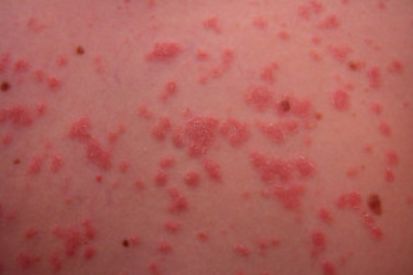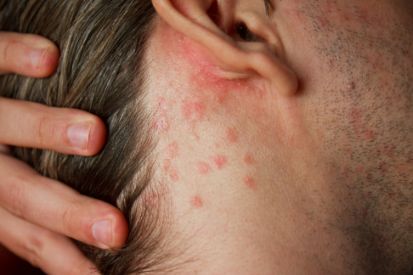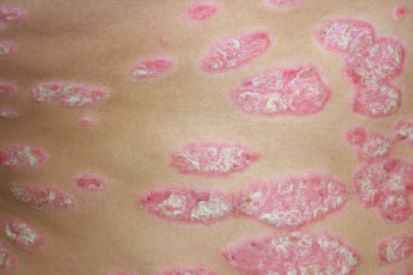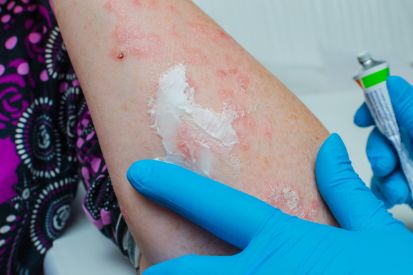Psoriasis
Psoriasis can appear in different forms:
Plaque psoriasis: The most prevalent type, marked by red or pink patches with a silvery scale, commonly found on the scalp, elbows, knees, hands, feet, and nails.
Guttate psoriasis: Frequently diagnosed in children, though it can also occur in adults, often emerging after illnesses like strep throat.
Pustular psoriasis: Identified by pus-filled blisters surrounded by red skin, typically on the hands and feet.
Inverse psoriasis: Found in skin folds, such as the armpits and groin, appearing as smooth, red patches.
Each year, psoriasis affects 4.5 million Americans, with a slightly higher incidence in women. At Pinehurst Dermatology & Mohs Surgery Center, we provide a range of treatments to help manage this condition effectively.
Examples of Psoriasis




What are the Symptoms of Psoriasis?
- Red, inflamed skin.
- Silvery-white scales.
- Itching or burning sensation.
- Dry, cracked skin.
- Thickened or pitted nails.
- Joint pain and swelling in some cases.
What Causes Psoriasis?
- Genetic factors: Psoriasis often runs in families, suggesting a genetic predisposition to the condition.
- Immune system dysfunction: Abnormalities in the immune system can lead to an overactive response, triggering rapid skin cell growth.
- Other health conditions: Psoriasis is associated with an increased risk of other health issues such as cardiovascular disease, diabetes, and certain autoimmune disorders.
How to Prevent Psoriasis
Psoriasis FAQs
There is no cure for psoriasis, but it can be managed with treatments that reduce symptoms and control flare-ups. Treatments include topical creams, light therapy, and systemic medications.
Psoriasis is typically diagnosed through a physical examination of the skin by a dermatology provider. In some cases, a biopsy may be performed to confirm the diagnosis.
The exact cause of psoriasis is unknown, but it is believed to be related to a combination of genetic and environmental factors. Triggers can include stress, infections, skin injuries, and certain medications.
Yes, lifestyle changes like reducing stress, avoiding known triggers, maintaining a healthy diet, and using moisturizing products can help manage psoriasis symptoms.
No, psoriasis is not contagious. You cannot catch it from or transmit it to others.
Psoriasis Treatment at Cumberland Skin
Psoriasis Treatments
- Oral and injectable medications that affect the immune system to control the psoriasis.
- Tight therapy treatment.
- Laser treatment and more.
Our dermatologists tailor treatment plans to individual needs, emphasizing a balance between managing symptoms and minimizing potential side effects. Regular monitoring and follow-ups with our team of skin experts are crucial for effective psoriasis management and to develop a health skin routine for years to come.
Featured Products

iS Clinical Extreme Protect SPF 40
Extreme Protect SPF 40 is a multilevel environmentally protective treatment formula featuring our proprietary Extremozyme® technology combined with scientifically advanced all-physical sunscreen actives; transparent micronized Zinc Oxide and transparent micronized Titanium Dioxide. This antioxidant-rich state-of-the-art broad spectrum UVA/UVB sunscreen helps support optimal skin health as it moisturizes and protects. 100 g e Net wt. 3.5 oz.

Revision Gentle Foaming Cleanser
Revision Gentle Foaming Cleanser is a soap-free cleanser that comforts and moisturizes all skin types. 5 fl oz / 150 mL
